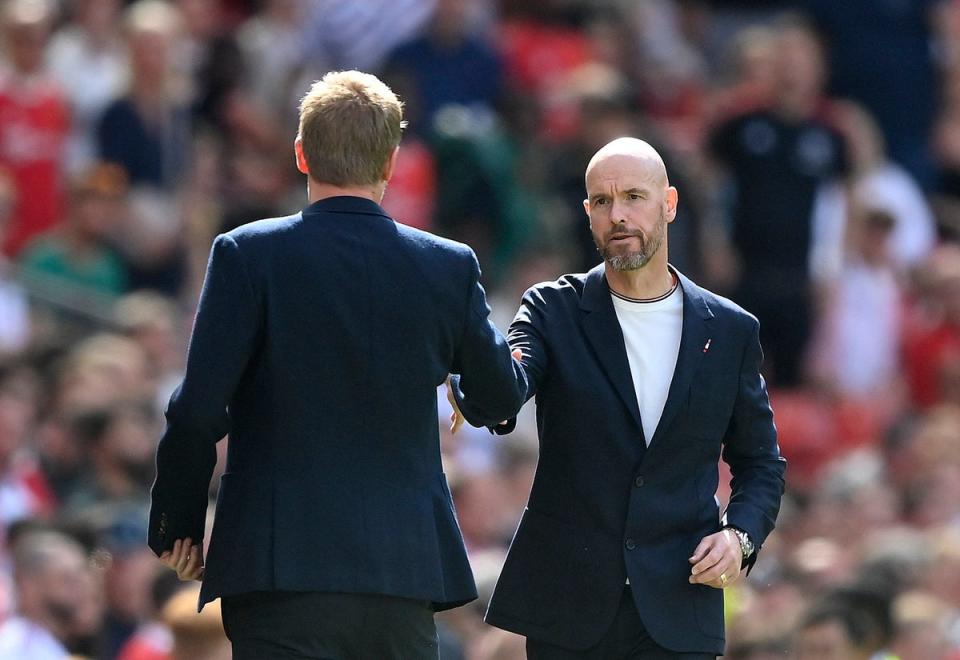Brighton are everything Manchester United aren’t

As the dust settled on the surprise result of this Premier League season’s opening weekend, you were left to wonder whether it was really that much of a surprise at all.
Granted, few expected that the cautious optimism built up over the summer at Manchester United would only survive half an hour of Erik ten Hag’s first game in charge. And when Pascal Gross opened the scoring, nobody thought he would add a second before half time. This was a famous result for Brighton and Hove Albion. Historic, even. The first win at Old Trafford in their 121 years of existence.
But at the sound of the final whistle, what had this game contributed to the sum total of human knowledge? Not a lot. The only conclusions to draw were already well known and long-established.
Graham Potter’s side are expertly coached. They have a clear, defined identity and style of play. Their strengths lie in their work as a collective rather than the abilities of individuals. They are even capable of selling those individuals for money, then exchanging that money for new and better individuals. In other words, Brighton are everything that United, in their current guise, are not.
To what extent was this really a surprise, then? Anyone who watched the 4-0 humbling at the Amex in May – possibly the most rancid of all United’s rancid displays last term – would not be especially taken aback. This was not as poor a performance, the scale of defeat not as large. But rather than coming at the end of a miserable season, it spoiled a new beginning, and for that could prove far more damaging.
It felt telling that even Ten Hag himself was not particularly surprised by what he had seen. The United manager put the result down to a sudden loss of self-belief among his players during a first half when they were second best to Brighton in every department.
“That cannot happen,” he said. “Always believe in yourself, stick as a team together, be convinced always on the pitch, that’s what we’re here for.” There were brief signs of life in United after the break, during the sustained spell of pressure that eventually forced Alexis Mac Allister’s own goal, but then next to nothing again once a point was within their grasp.
Asked if this apparent loss of belief among his players had caught him off guard, Ten Hag admitted: “I knew it could happen.” Were there any warnings during pre-season that a sudden switch like that was possible? “I think so,” he said, “but it’s also normal.”
The trauma of last season’s lowest-ever Premier League points tally is probably still playing a part. It seemed instructive that debutants Christian Eriksen and Lisandro Martinez were two of United’s better players. Others appeared as fearful as they had at any point under Ten Hag’s predecessors. “I can understand that after last year,” their new manager said, “but it’s not necessary, because they are good players. Self-belief is from yourself. Bring it on the pitch.
“They are good players,” Ten Hag would insist. “They have proved so many times in the past and will again in the future.”
He may well be right. The noises out of Carrington have so far been positive so far, even if there is an understanding it will take time for United to adjust to their new manager’s methods. Ten Hag’s altogether more tactically demanding style of play will require adaptation, time on the training ground is needed to perfect the rotations and repetitions on which his football is based, but there is belief it should be worth it. Pre-season was not without promise. But only one team at Old Trafford on Sunday seemed as though they are able to look forward to the immediate future. It was not the one booed off the pitch.
Then again, Brighton have been there before. Quite recently, too. It is less than a year since Potter and his players were jeered by their own supporters when, despite sitting eighth in the Premier League, a goalless draw at home to Leeds stretched a winless streak to nine games. It would be part of a run that saw Brighton win just three of 25 in the league between late September and early April, in including six defeats in a row at one stage.
Potter survived, obviously. A set of results that might finish off a manager at a more trigger-happy club barely registered outside of East Sussex. Ten Hag has to be afforded the same level of support by the club and shown the same level of patience in other quarters if this latest cultural reset is to mean anything, let alone be successful. He has to be able to fail, in the manner his side did on Sunday, if anything is to change.
It would help if, like Potter at Brighton, he could do that without the incessant glare of public scrutiny into every poor result or bad performance. But then if he were, that would be far more surprising than anything witnessed at Old Trafford on Sunday. We have already established these are two very different clubs, who currently look to be on very different trajectories.

 Yahoo Sports
Yahoo Sports 